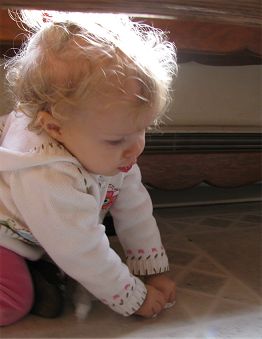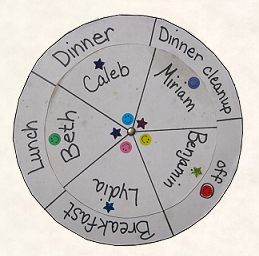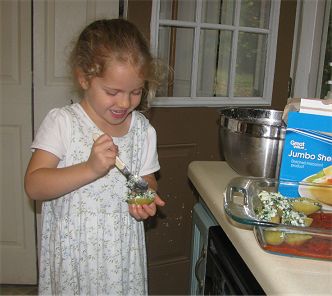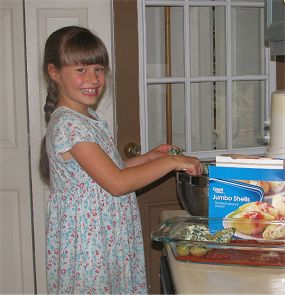|
About
Children
Chores and Young Children
by Beth
Thompson, Aspiring Midwife
 |
Beth is
the oldest of seven children--Caleb (15), Miriam (13), Benjamin
(11), Lydia (8), Tabitha (5), and Rebekah(1). She is full of
joy and cheerfulness and is an always willing servant within her
family. When she is not working on finishing her school
studies for her senior year, she loves to read, knit, help with her
younger siblings, babysit, cook, read her Bible, play piano and
viola, participate in the Richmond Youth Strings orchestra, go for
walks, and spend time with her family. She took on the
responsibility of the family garden during this past summer season
and did a wonderful job growing some amazing veggies. She always has
a ready smile and word of encouragement for everyone and radiates
the LORD every day. Beth is
the oldest child of our very own Rachel Thompson. Rachel is a Charis
coach for the doula / childbirth educator program and has been an
absolute wonderful servant for many pregnant families. |
Instilling responsibility in young children is important, especially when they
are very young and their characters are still developing. The attitude that is
created in them toward work will be carried with them throughout their entire
lives. Involving children in everyday chores gives them opportunities to learn
responsibility and develop a healthy attitude toward work.
Helpful Children
Even very young toddlers can help with the household chores, and should! Being
part of the family means that they are part of the team, and therefore, ought to
help out with the daily workload. Children are more likely to be willing and
ready to work if they can tell that their help is valuable. The little ones love
to work alongside Mama (or big sister or brother). When it is time to fold
laundry, they can fold washcloths and cloth napkins and match socks (a good
lesson in putting like colors together). My younger sisters hang out the cloth
diapers on a drying rack, bring them in when they are dry, fold them, and put
them away. They can help set napkins and silverware around the table before
supper and clear their place when they are through. Dusting is also a good chore
for small children. As parents and older siblings, we have the opportunity to
encourage the children in their work by genuinely praising them when they do a
good job. They will be assured that they are part of the family team, and that
we are proud of them!
My siblings and I have always been required to tidy up our own messes. If we got
toys out, it was our job to clean them up also. As soon as a baby is capable of
taking his toys out of a basket to play with, he is able to put them back in
again. Even just this morning, my twelve month old sister got hold of a washable
marker and drew on the linoleum kitchen floor. We gave her a wet rag, and
cheerfully told her, “Wash the floor”. She took the rag, and wiped up the blue
marker streaks. She is learning now, as a young toddler, to be responsible about
cleaning up her own messes.

One year old Rebekah washing
the floor
Regular Jobs
In our home, we each have chores that need to be done daily, many before we eat
breakfast. It is helpful for young children to have a chart with their duties
outlined for them, so that they know what is expected of them. For the ones who
cannot yet read, you can take pictures of them doing their daily chores (such as
making their beds, cleaning up their toys, putting away their clothes, brushing
their teeth), and make a “picture chart” for them.
Feeding our animals is one of the regular chores that we do every morning before
we eat breakfast. Proverbs 12:10 says, “A righteous man regardeth the life of
his beast”, and so each morning we feed our “beasts” (chickens, rabbits, and a
kitty), before we ourselves eat.
Kitchen duties are switched around in our family, and with the help of the “meal
wheel”, we all know when it is our turn to have clean up in the kitchen. The
wheel consists of two cardboard circles, each divided into a certain number of
sections depending on how many children are involved in cleaning the entire
kitchen, with the kitchen duties written on the outer circle, and our names
written on the inner circle. Every week, we turn the inner circle, and we each
get a different kitchen assignment. This allows for some variation in the
kitchen cleaning job and opportunity to learn different skills. The wheel method
could be used for other chores as well. Even though our youngest siblings are
not carrying the load of cleaning the entire kitchen at this point, they help
with things like distributing napkins at meal time, and putting away clean
dishes once they are washed.

Meal Wheel
Each of us also have assigned rooms that we are responsible to keep neat and
tidy. In every room, there is a list that outlines what must be done before the
room may be considered “clean”. Since children's idea of clean may differ from
Mother's, it helps them to know what is they are expected to do. The little ones
come along side the older children in the family and work with them, learning
the skills of keeping house and sensing that they are part of the effort.
My siblings enjoy playing the “180 second game”, in which one person counts to
180, while everyone cleans up as fast as they possibly can. The idea is to see
if they can finish cleaning the room before the “counter” reaches 180 seconds. This makes cleaning a room more like a game than a chore, because everyone is
“racing against the clock”. We have used many different numbers in the past, and
if the mess is a smaller one, we could play the 60 second game, instead of the
180 second game. Making work fun always causes us to enjoy it more.
Our Attitude Towards Work
Example is the best teacher of all. Children learn more about work and
responsibility from watching Mama and Daddy (or big sister and brother) and from
working with them, than from anything “taught” with words. If we all do our work
cheerfully and “heartily, as unto the LORD” (Col. 3:23), the little ones will
see that, and know that work is to be done with a good attitude! On the flip
side, if our attitude declares that we consider chores a burden, the children
will not be inclined to help with the work. When work is performed with a
thankful heart, it becomes much more fun for everyone!
Children who are taught to work when they are young will know how to be
responsible adults when they are grown. It is important that a good work ethic
is instilled in these little ones, because when they are older, they will need
to know how to work diligently and carry larger loads. More importantly, GOD has
created us to be able to work, and he gave us six days in which we are to do all
our work (Exodus 20:9). Let us, with these little ones alongside us, do our work
with all our might, as unto our LORD!

Five year old Tabitha

Eight year old Lydia

'Behold, I will bring them from the north country, And gather them
from the ends of the earth,
Among them the blind and the lame,
The woman with child and The one who labors with child, together,
A
great throng shall return there...And My people shall be satisfied with My goodness, says the LORD.'
Jeremiah 31:8, 14
~~~
©2013 Charis Childbirth
Services, All Rights Reserved
Feel free to forward this newsletter to friends in its entirety,
leaving all attribution intact.
November
2013
|